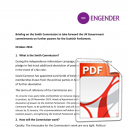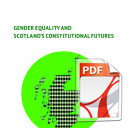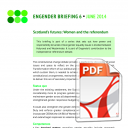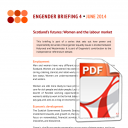Engender blog
We celebrated IWD by talking about women's equality & Scotland's futures
Our International Women's Day conference on 7 March brought together 150 women to talk about women's equality in the context of the independence referendum. We were hosted at Glasgow City Chambers by Councillor Martha Wardrop, and in these lavish surroundings we launched our report on equality and the current division of power and responsibility between Holyrood and Westminster.
Excellent report from @EngenderScot: which both YES and Better Together should chew on : http://t.co/5S0q5oWxFo #IWDScot
— Joanne MacInnes (@joannemacinnes) March 8, 2014
We were very pleased to hear from the Deputy First Minister, Nicola Sturgeon MSP, who followed a moving tribute to Professor Ailsa McKay by setting out the Scottish Government's position that gender equality can best be achieved by independence.
Politics and power
Our politics panel was chaired by Professor Fiona Mackay, who framed the gender imbalance in parliaments, councils, and policy spaces as being "less about the underrepresentation of women, and more about the overrepresentation of men." Talat Yaqoob, a feminist and Labour activist, exhorted delegates to take their passion for single-issue campaigns to political parties, and bring pressure to bear on parties to take action on issues of concern to communities.
Juliet Swann, from the Electoral Reform Society, talked about the factors that make women more likely to engage with politics, including seeing other women 'doing politics'. Tasmina Ahmed Sheikh, SNP Women's Officer, spoke about the 'independence dividend' of pro-independence and pro-union women using the independence referendum as an opportunity to envision a more equal Scotland.
There was widespread agreement on the panel that balancing measures, including quotas, had merit, although the Scottish Labour and Green parties are the only parties in which they are used.
RT @EngenderScot: Cllr Martha Wardrop suggests a role for CoSLA in looking at gender balance across councils. #IWDScot
— SGP Women (@SGPWomen) March 7, 2014
Care and the constitution
Engender and University of Stirling are partners in a project looking at the future of care under different constitutional arrangements.
Professor Kirstein Rummery, delivered an input on the ways that care is delivered in a range of countries across Europe and beyond. This presentation was filmed, and will be be available soon.
Let's imagine a world where right to childcare is embedded in a written constitution - inspiring! #IWD2014 @EngenderScot @KirsteinRummery
— Emma Lee Hutton (@emmaleehutton) March 7, 2014
Women and the economy
We started our economy panel with a tribute to Professor Ailsa McKay, to whom we are dedicating our forthcoming film about women and the economy.
Ailsa's work was reflected in the contributions of many of the participants. Jackie Brierton from Women's Enterprise Scotland called for childcare for self-employed people to be tax-deductible. Anna Ritchie Allan from Close the Gap spoke about the distance we have travelled towards economic equality, and their work to create networks of women to challenge discrimination, including Women in Renewable Energy Scotland. Ann Henderson from the STUC spoke about the importance of women's organising, and the Women's Employment Summit.
Dr Angela O'Hagan from WiSE identified that the independence debate offered an opportunity to look at existing structures and ways of working, and called for gender budget analysis to be fully implemented in the Scottish budget process. Lynn Robertson from Maryhill Women's Resource Centre spoke about the disconnect between women and economic policymaking.
How to (re)build women's grassroots networks? More women's centres, says Maryhill's Lynne Robertson #IWDScot @engenderscot
— Gender Politics (@genderpol) March 7, 2014
@EngenderScot - glad to be part of IWD Shaping Scotland's Future - childcare, value of women's contribution to economy, high on agenda
— STUC Women's Cttee (@STUCwomen) March 7, 2014
Violence against women
Dr Marsha Scott chaired a discussion on violence against women that chiefly focused on how to make prevention work and services for women sustainable. Fatou Baldeh from DARF, Sandie Barton from Rape Crisis Scotland, and Karin Engstrom from Hollaback! Edinburgh discussed whether there had been any progress in changing the sexist attitudes enabling violence against women in the 40 years since the women's sector brought itself into being, and the links between violence against women and women's inequality.
Mock referendum
We polled all of our delegates in the morning when they arrived, and at the end of the day. We had some people arrive and leave during the day, so we comparing the percentages of the total vote.
We asked Should Scotland be an independent country?
|
|
First vote (morning
|
Second vote (end of day) |
|
Yes |
59% |
61% |
|
No |
22% |
21% |
|
Don’t know |
19% |
18% |
The reviews
We were very pleased at the positive feedback we received from conference delegates, and are glad that so many of you had an inspiring and interesting day. We received some useful comments back about some of the things that worked less well, and will be incorporating some great ideas into the planning of our future events.
Feeling the love and sisterhood at #iwdscot @engenderscot Always great to be in a room full of inspirational women!
— I Speak for Myself (@Ispeakforme2014) March 7, 2014
Thank you @EngenderScot for yesterday's enlightening event. Easy to get caught up in independence debate without a gender based analysis
— You Can Change This (@ChangeThis_Scot) March 8, 2014
Thanks to @EngenderScot for an inspiring and informative #IWDScot conference. Great opportunity to hear from a wide range of speakers.
— Close the Gap (@closethepaygap) March 8, 201
Share this post on …
Comments: 0 (Add)
Downloads
A Gender Edit of Scotland’s Future: Your Guide to an Independent Scotland This document is a ‘gender edit’ of the Scottish Government's white paper, which sets out its case for a ‘yes vote’ in the referendum.
 Engender Briefing on the Smith Commission
A short briefing paper on the Smith Commission on further devolution to the Scottish Parliament.
Engender Briefing on the Smith Commission
A short briefing paper on the Smith Commission on further devolution to the Scottish Parliament.
 Gender Equality and Scotland's Futures
This policy report is Engender's contribution to the Scottish independence debate.
Gender Equality and Scotland's Futures
This policy report is Engender's contribution to the Scottish independence debate.
 Scotland's Futures: Women and Care
This briefing is part of a series that sets out how power and responsibility to tackle critical gender equality issues are divided between Holyrood and Westminster.
Scotland's Futures: Women and Care
This briefing is part of a series that sets out how power and responsibility to tackle critical gender equality issues are divided between Holyrood and Westminster.
 Scotland's Futures: Women and Poverty
This briefing is part of a series that sets out how power and responsibility to tackle critical gender equality issues are divided between Holyrood and Westminster.
Scotland's Futures: Women and Poverty
This briefing is part of a series that sets out how power and responsibility to tackle critical gender equality issues are divided between Holyrood and Westminster.
 Scotland's Futures: Women and the Referendum
This briefing is part of a series that sets out how power and responsibility to tackle critical gender equality issues are divided between Holyrood and Westminster.
Scotland's Futures: Women and the Referendum
This briefing is part of a series that sets out how power and responsibility to tackle critical gender equality issues are divided between Holyrood and Westminster.
 Scotland's Futures: Women, Politics and Power
This briefing is part of a series that sets out how power and responsibility to tackle critical gender equality issues are divided between Holyrood and Westminster.
Scotland's Futures: Women, Politics and Power
This briefing is part of a series that sets out how power and responsibility to tackle critical gender equality issues are divided between Holyrood and Westminster.
 Scotland’s Futures: Women and the Labour Market
This briefing is part of a series that sets out how power and responsibility to tackle critical gender equality issues are divided between Holyrood and Westminster.
Scotland’s Futures: Women and the Labour Market
This briefing is part of a series that sets out how power and responsibility to tackle critical gender equality issues are divided between Holyrood and Westminster.

Newsletter
Sign up to receive our newsletter here:
Sign up to our mailing list
Receive key feminist updates direct to your inbox: